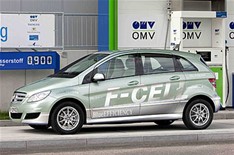All three German luxury car makers now have plans to launch battery-electric vehicles before 2020 to counter the unlikely success of California's Tesla Motors.
Whether their electric cars are sedans, SUVs, or both, they will likely be sized and priced to compete with the Tesla Model S and Model X now in production.
Now that Germany has enacted domestic electric-car sales incentives, it appears that one maker has accelerated its plans.
DON'T MISS: Germany's $1 billion electric-car incentive plan approved by cabinet
Mercedes-Benz is now planning to add no fewer than four separate all-electric models to its lineup by the 2021 model year, according to Britain's Autocar magazine.
Two electric sedan models will be sized roughly the same as the mid-size C-Class and large S-Class gasoline and diesel models, the report says.
A pair of accompanying electric crossover SUVs, meanwhile, will compare to the GLA compact hatchback and GLC mid-size crossover utility vehicles.

2016 Mercedes-Benz GLC-Class - First Drive, July 2015
The faster development was pushed by outgoing R&D chief Thomas Weber, according to the report.
Still, "a heavy shroud of secrecy surrounds the upcoming electric-powered Mercedes models," it says.
Adapting existing platforms is the more conservative approach toward offering electric cars, compared to development of a dedicated battery-electric architecture (as Tesla has done).
DISCUSS: Mercedes 'ELC' To Compete With Audi e-Tron Electric SUV In 2018: Report
According to the Autocar piece, Mercedes feels that volume of 50,000 units a year or more would be required to justify the cost of a dedicated model.
Indeed, a Mercedes executive told Green Car Reports last fall that the company is entirely capable of building fully competitive electric cars, but would do so only when the business made sense.
The first electric vehicle to emerge from Mercedes is likely to be a version of its GLC crossover, under the model name 'ELC,' previously expected at the end of 2018.

2016 Mercedes-Benz GLC-Class - First Drive, July 2015
Such a Mercedes-Benz ELC electric SUV would share just its roof and windows with the existing GLC, which launched for 2016 and replaced the previous GLK.
The rest of the ELC's body will be heavily modified, to reduce aerodynamic drag to an absolute minimum for longer range.
According to the German magazine Autobild, it will have a flat battery pack under the floor, at least two motors (one per axle), and up to 400 kilowatts (540 horsepower) of output.
CHECK OUT: Mercedes: 'More Than Competitive' Electric Cars Possible--When Business Makes Sense
Mercedes is developing its own electric motors in house, Autocar suggests, saying they'll range from 75 to 400 kw of output.
It also plans to offer both plug-in and inductive charging on its all-electric vehicles, according to Autobild.
Except for the smallest GLA-based electric model, the battery-electric vehicles will all use underpinnings known to insiders as the MEA (Modular Electric Architecture).

Mercedes B Class Fuel Cell Hybrid
It's a derivative of the new MRA (Modular Rear Architecture) platform that is used for the current C-Class, brand-new E-Class, and the S-Class launched in 2013.
Before the battery-electric models arrive, however, a GLC Fuel Cell will actually be the first vehicle to use the adapted platform.
Weber has described the hydrogen-powered vehicle as a forerunner to the range of electric models that will follow.
_______________________________________













